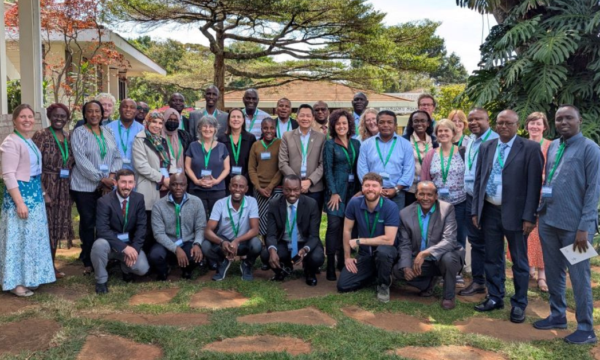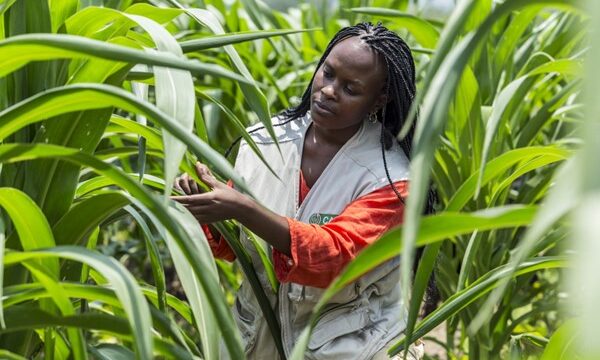
It has now been more than 50 years since CABI started a successful journey in Malaysia to establish scientific research collaboration with key organisations involved in agriculture and plant health.
In 1969, CABI started to work in Malaysia as CIBC (Commonwealth Institute of Biological Control) and in 1987, Malaysia joined CABI as a member country.
The following year, CABI’s regional office was established through an agreement with the Government of Malaysia. In 1995, the CABI office moved to the MARDI site near UPM Serdang, approximately 30 km south of Kuala Lumpur City Centre.
Recently, CABI and Malaysian Agricultural Research and Development Institute (MARDI), convened a workshop on crop pest management and Trichogramma production system, to unveil strategies to fight crop pests that threatens food security in Malaysia.
The workshop included results and knowledge sharing from Prof ZHOU Xueping, Director and Prof LIU Xingang, Deputy Director from the State Key Laboratory for Biology of Plant Diseases and Insect Pests, Institute of Plant Protection (IPP), Chinese Academy of Agricultural Sciences (CAAS), Professor ZHENG Li, Senior Research Scientist at Institute of Plant Protection (IPP), Shandong Academy of Agricultural Sciences (SAAS), and Professor LI Dunsong, Head of the Biological Control Research Laboratory at Plant Protection Research Institute (PPRI), Guangdong Academy of Agricultural Sciences (GAAS).
The event, held at the Palm Garden Hotel, Putrajaya, was attended by staffs from CABI and MARDI. It was followed by a visit to a Trichogramma rearing facility and MARDI’s field demonstration site at Tanjung Karang, where Trichogramma release techniques are applied.
The workshop follow-up witnessed a recent signing of a Memorandum of Understanding (MoU) to increase MARDI’s capacity in biocontrol, prevention and management of invasive species, the development of Integrated Pest Management (IPM) and the conservation, exploitation and utilisation and exchange of biological resources.
The MoU also sees CABI and MARDI working to reduce the use of chemical pesticides and the use of safer-to-use and environmentally-friendly bioprotection products to fight crop pests and diseases such as the fall armyworm (Spodoptera frugiperda), diamondback moth and stemborers and leaf-folders of rice.
Empowering participants on Trichogramma production systems
One such way in which the two parties hope to tackle the scourge of crop pests and diseases which can impinge upon the livelihoods of smallholder farmers and ultimately, food security, is through the rearing of Trichogramma sp.
Trichogramma is a genus of minute polyphagous wasps that are endoparasitoids of insect eggs and have been used worldwide for the control of lepidopteran pests for many years. A single female can parasitise up to 10–20 host eggs of a crop pest a day.
The objectives of the workshop were to empower participants with knowledge on pest management and on Trichogramma production systems, and to increase skills through shared knowledge from experts from a diverse range of organisations.
The workshop also served to strengthen the possibilities for networking and collaboration in relation to IPM and Trichogramma mass rearing and field release techniques.
Presentations, which were appreciated by all scientists and researchers, were given by highly ranked Chinese professors. Insightful discussions followed each presentation, which helped to engage all participants to better understand the future challenges and opportunities in this area.

Dr Feng Zhang, Regional Director for CABI East & South-East Asia, made the welcoming remarks and presented on CABI’s history and previous achievements, with emphasis on the Malaysia-China-CABI tripartite partnerships.
Emphasis on Malaysia-China-CABI tripartite partnerships
He highlighted in his presentation CABI’s key areas of expertise, products and services in plant health. Dr Feng also shared an update on the MARA-CABI Joint Lab and on over 40 years of successful collaboration between CABI and China.
Dr Feng’s presentation was followed by Mr Mohd Saranum, of MARDI, who gave a presentation entitled “From baby steps to big leaps: MARDI’s learning journey in producing Trichogrammachilonis.”
DrArnaud Costa, Crop Health Advisor at CABI East &South-East Asia, presented on “Sustainable alternatives for coffee and sweet potato in Vietnam.”
His presentation was inclusive of key information regarding sustainable paths to reduce pesticide usage and promote non-chemical approaches.
The work conducted in Vietnam with the coffee sector has been done with support from the Global Coffee Platform (GCP) Collective Actions Initiative (CAI) while the work on sweet potato weevil has been supported by BRT (Bright Resources Technology) Sdn. Bhd. in Malaysia.
Dr Costa said, “Achieving sustainable practices for coffee and sweet potato represents a challenge considering that most farming is done through monocropping. This uniform landscape ultimately creates a favourable scenario for several pests and diseases.
“Excessive and inappropriate use of pesticides is still a pervasive issue and future farming systems need to establish successful IPM plans to address this concern.”
Examples provided in Dr Costa’s presentation encompass the use of non-chemical approaches such as biocontrol and pheromones.
He said it is also necessary to avoid repeated use of the same category of pesticides that can create pest resistance since these molecules target the same mode of action.
Dr Zhang said, “The MARDI-CABI joint workshop has been the continuation of CABI’s successful work in Malaysia, which started more than half a century ago, and has been an important event to set the scene for collaboration with MARDI.
“This scientific event has reinforced the partnership between CABI and MARDI. Future scientific works in relation to biological control and IPM can be developed between both parties and it is hoped that this joint workshop will be a key milestone, leading to extended collaboration in future.”

Additional information
Main image: Participants at the workshop which explored a Trichogramma production system to fight crop pests that threatens food security in Malaysia (credit: MARDI).
Relevant stories
‘CABI renews agreement with Malaysian Agricultural Research and Development Institute.’
Related News & Blogs
Strengthening the potato value chain in the Kurdistan Region of Iraq
On 30th May, we marked the International Day of Potato. In this blog, CABI’s Crop Health Advisor Anna Wood provides an update on a five-year project led by CABI to strengthen the potato value chain in the Kurdistan Region of Iraq. An ambitious five-yea…
3 June 2025




